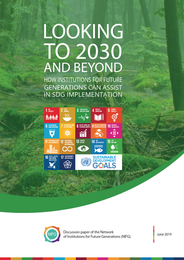In his role of Ombudsman for Future Generations in Hungary, Dr. Gyula Bándi hosts the Secretariat for the Network of Institutions for Future Generations in his office. The Network of Institutions for Future Generations (NIFG) is pleased to share its SDG discussion paper entitled: "Looking to 2030 and Beyond - How Institutions for Future Generations Can Assist in SDG Implementation”. With the UN High-level Political Forum, the main UN platform for the follow-up and review of the 2030 Agenda approaching in July, NIFG would like to highlight how various institutions representing the interests, rights and well-being of future generations are unique and important assets in national and international long-term governance as well as how they can specifically be useful enablers in the implementation of the SDGs.
NIFG was established in 2014 in Budapest by institutions highlighted in the UN Secretary General’s 2013 report “Intergenerational Solidarity and the Needs of Future Generations”, as ‘model institutions’ working to realise intergenerational equity in everyday policy-making. NIFG is an independent, non-formal international network encompassing national institutions advocating for future generations. NIFG works towards ensuring that the interests, rights and well-being of future generations are endorsed by decision-makers; it shares best practices among existing institutions and grassroots initiatives, and strives to build capacity and promote the establishment of similar local, regional and national institutions. In line with the goal to “seek to realise human rights for all”, members of NIFG work towards implementing the 2030 Agenda precisely “for the full benefit of all, for today’s generations and for future generations”.
The newly presented SDG discussion paper highlights that unless we seek to improve governance structures and systems, we risk not meeting the SDGs and passing on a world with drastically diminished opportunities to the generations to come. This is why independent institutions for future generations are engaging with the SDGs through innovative, cross-cutting and horizontal interventions which work in the interests of both present and future generations. The paper argues that getting beyond the well-intentioned rhetoric, advocates for future generations can help bring the intergenerational lens to policy-making. By working alongside governments, public authorities, and connecting with communities and the broader public, these institutions for future generations are successfully stimulating dynamic and fresh approaches to social, economic and environmental challenges. The paper undermines this with several examples.
In order to read the full SDG discussion paper: click here.

